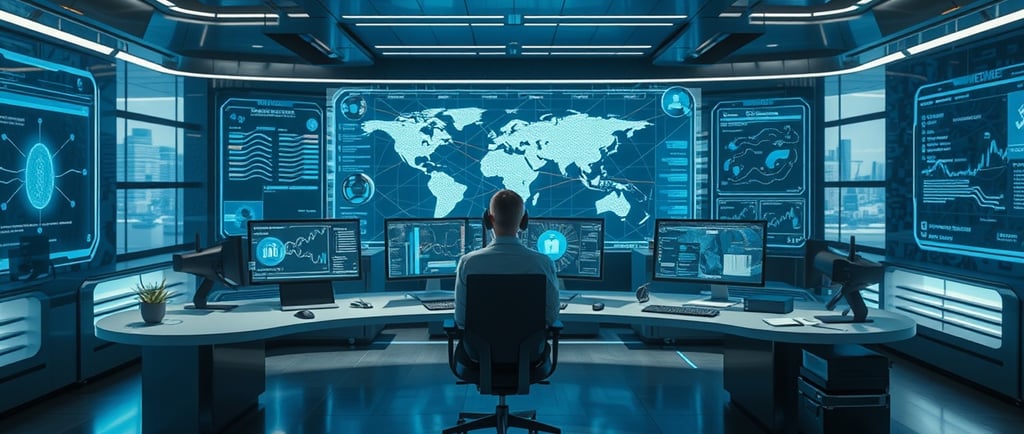The Role of Artificial Intelligence in Cybersecurity
Artificial Intelligence importance in Cybersecurity
ETHICAL HACKING & CYBER SECURITY
Shreyash Shukla
11/24/20243 min read


Introduction to Artificial Intelligence in Cybersecurity
Artificial intelligence (AI) is like the superhero of the cybersecurity world, swooping in to save the day with its advanced capabilities. In this digital age where cyber threats lurk around every virtual corner, understanding the role of AI in modern cybersecurity is crucial for staying ahead of the game.
Understanding the Role of AI in Modern Cybersecurity
AI plays a vital role in bolstering the defense mechanisms against cyber attacks by analyzing vast amounts of data at lightning speed. It acts as a digital shield, detecting and neutralizing threats before they wreak havoc on systems and networks.
Evolution of AI Technologies in the Cybersecurity Landscape
The evolution of AI technologies in cybersecurity has been nothing short of revolutionary. From basic rule-based systems to sophisticated machine learning algorithms, AI has come a long way in fortifying the digital fortresses of organizations against an ever-evolving threat landscape.
Applications of Artificial Intelligence in Threat Detection
When it comes to threat detection, AI is the ultimate sidekick that helps organizations identify and combat cyber villains with precision and accuracy.
Utilizing Machine Learning for Real-Time Threat Detection
By harnessing the power of machine learning, AI enables real-time threat detection, allowing security teams to stay one step ahead of cyber adversaries. It's like having a digital watchdog that never sleeps, constantly scanning for signs of malicious activity.
Behavioral Analysis and Anomaly Detection with AI
AI excels at behavioral analysis and anomaly detection, sniffing out suspicious patterns and deviations that may indicate a cyber threat. It's like having a savvy detective on the case, piecing together clues to uncover potential dangers.
Enhancing Incident Response and Recovery with AI
In the aftermath of a cyber attack, AI lends a helping hand in streamlining incident response and recovery processes, minimizing the impact of security breaches.
Automating Incident Triage and Response Processes
AI automates incident triage and response processes, enabling security teams to swiftly identify and mitigate security incidents. It's like having a digital assistant that takes care of the grunt work, allowing human experts to focus on strategic decision-making.
AI-Driven Threat Intelligence for Proactive Defense
With AI-driven threat intelligence, organizations can adopt a proactive defense stance, preempting potential threats before they materialize. It's like having a crystal ball that predicts the future of cyber threats, empowering organizations to stay a step ahead of cybercriminals.
AI-Powered Security Analytics and Monitoring
AI's prowess in data analysis and pattern recognition makes it a formidable ally in the realm of security analytics and monitoring, providing organizations with valuable insights for safeguarding their digital assets.
Role of AI in Data Analysis and Pattern Recognition
AI plays a pivotal role in data analysis and pattern recognition, sifting through mountains of security data to identify trends, anomalies, and potential threats. It's like having a data scientist on steroids, crunching numbers and spotting outliers with lightning speed.
Continuous Monitoring and Adaptive Security with AI
By enabling continuous monitoring and adaptive security measures, AI ensures that organizations can adapt to emerging threats in real-time. It's like having a chameleon-like defense system that can change colors and tactics to stay one step ahead of cyber adversaries.
Addressing Challenges and Limitations of AI in Cybersecurity
Artificial Intelligence (AI) may sound like a superhero in the fight against cyber threats, but it's not without its kryptonite. One major concern is the ethical and privacy implications that come with using AI in security. As AI becomes more sophisticated, questions about how it collects and uses data, and whether it respects user privacy, are becoming increasingly important.
Ethical and Privacy Implications of AI in Security
Imagine your AI security system accidentally sharing your browsing history with the entire internet - yikes! As AI becomes more prevalent in cybersecurity, ensuring that it operates ethically and respects user privacy is crucial. It's like giving your security guard a manual on not peeking through your windows.
Overcoming Bias and Trust Issues in AI Security Systems
Even AI can have its biases - it's not all algorithms and rainbows. Ensuring that AI-based security systems are free from bias and can be trusted is a must. After all, you wouldn't want your AI security system mistaking your cat for a malicious intruder, right?
Future Trends and Opportunities for AI in Cybersecurity
The future of AI in cybersecurity is brighter than a spotlight on a disco ball. One exciting trend is the integration of AI with Internet of Things (IoT) security and cloud security. Imagine AI keeping your IoT devices safe from cyber-attacks - it's like having a digital bouncer for your smart home.
Integration of AI with IoT Security and Cloud Security
AI and IoT security are like peanut butter and jelly - they just go together. As more devices become connected, the need for AI to help secure these networks will only grow. It's like having a cyber watchdog that can sniff out threats before they even bark.
Conclusion
AI is transforming the field of cybersecurity, offering advanced tools and techniques to protect against cyber threats. By leveraging AI, organizations can enhance their security measures, respond to threats more efficiently, and stay ahead of cybercriminals.
Social Info
Empowering organizations with comprehensive security solutions.
For support and queries
Made with ♡ © 2025. All rights reserved.


